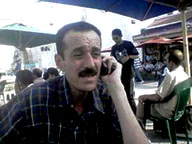In Tunisia, court orders transfer of syndicate board
New York, September 8, 2009—The Committee to Protect Journalists condemns a Tunisian court’s decision to recognize a pro-government board of the National Syndicate of Tunisian Journalists (NSTJ). Police today physically evicted members of the previous independent board from the syndicate’s offices, according to local journalists.
After advocacy, Tunisian sees end of cruel punishment
The government’s cruel treatment of Tunisian journalist Abdallah Zouari came to an end on August 1, a reminder that even the most autocratic regimes will yield to international pressure for press freedom. Zouari, a former reporter for the now-defunct Islamic weekly Al-Fajr, had been forced to live under a form of house arrest since his…
In Tunisia, government allies oust syndicate board
New York, August 17, 2009–The Committee to Protect Journalists condemns the ousting of the board of the National Syndicate of Tunisian Journalists (NSTJ) on Saturday. The syndicate was the only independent organization of its kind in Tunisia for critical journalists, providing them with syndication services among other benefits.
Tunisia must end reprisals against critical journalists
Dear Mr. President: As Tunisia’s October presidential and parliamentary elections draw closer, the Committee to Protect Journalists is writing to you for the second time in four months to protest reprisals against critical journalists and their families. It is inconceivable that free and fair elections can take place in an environment in which independent media are harassed and silenced. We urge you to honor your oft-stated commitment to promote free expression, and we ask that you instruct your government to allow our colleagues to perform their work unhindered.
A blogger in Tunisia: My life with the censor
The specter of government opposition to blogging, journalism, and free expression in general in Tunisia is so intense that the mere appearance of a specific name online is enough to push the government to block the Web site where it appears, even if that site is not critical of the government.
Audio Report: Worst Countries to be a Blogger
In our special report, “10 Worst Countries to be a Blogger,” CPJ names the world’s leading online oppressors. Here, Deputy Director Robert Mahoney explains why CPJ undertook this report and how it arrived at its conclusions. Listen to the mp3 on the player above, or right click here to download. (5:34) Read “10 Worst…
After CPJ letter, Tunis grants journalist freedom to travel
Nearly a week after CPJ sent a letter to Tunisian President Zine El Abidine Ben Ali urging him to end the “ongoing cycle of repression of critical journalists and media outlets,” Tunisia’s Ministry of Justice and Human Rights told Mohamed Abbou, a prominent human rights lawyer and writer, in a phone call on Saturday that…

Tunisian president calls criticism “unbecoming”
During his address to the nation on the anniversary of Tunisia’s independence on March 20, President Zine El Abidine Ben Ali did not hesitate to reject critical journalism and the right of journalists to cover corruption or mistakes by the government. As customary, local groups concerned with press freedom, including the Tunisian Observatory for Press Freedom…